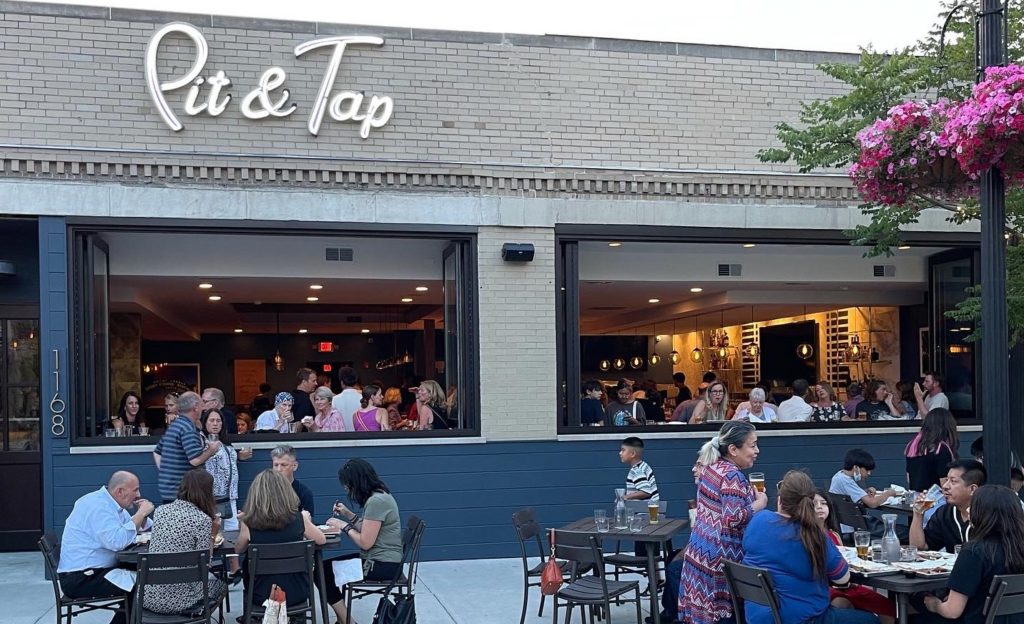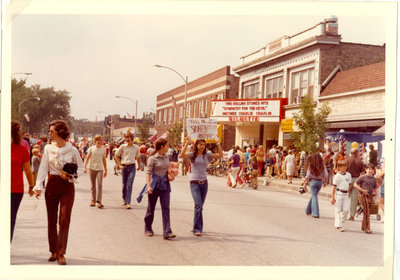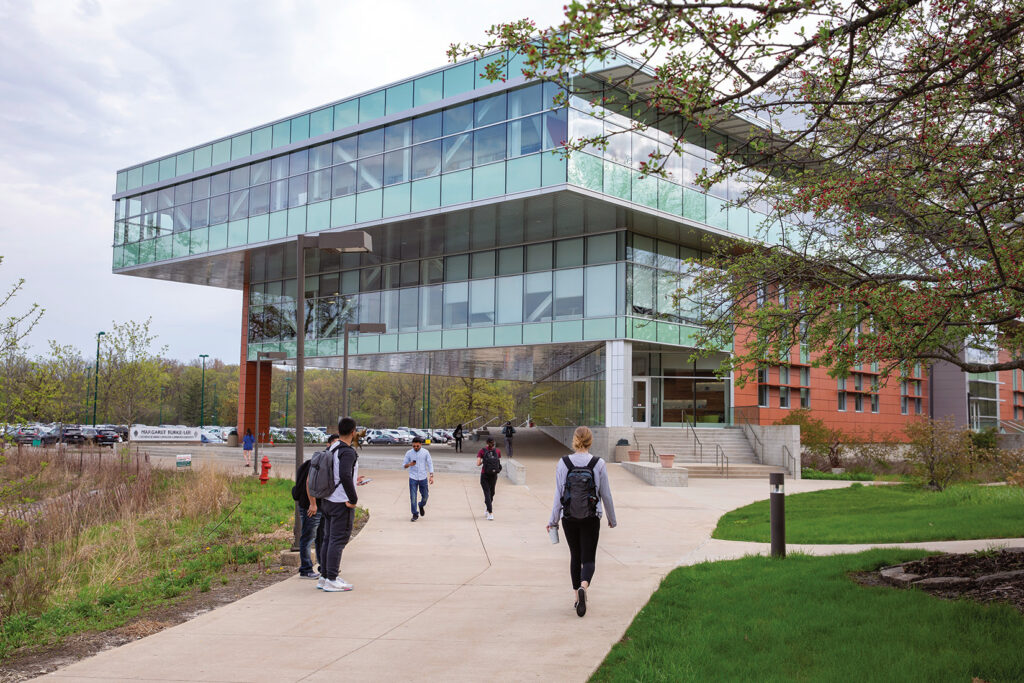
How Wilmette turned its downtown into a dining hotspot and a community hub
On a sunny summer day, the Wilmette and Central Avenue intersection is vibrant. Manicured trees and hanging flower pots cradle visitors in the lively village center. They enjoy their meals at outdoor tables on almost every corner and stride through the crosswalk from here to there — then back to here.
It certainly hasn’t always been this way.
Downtown Wilmette formed in the mid-1800s along with the construction of a train station in 1869. According to the Wilmette Historical Society, the beginning of the 20th century was a critical time for developing the commercial district that buzzes today. Many of the same buildings hang tough.
But approaching the 21st century, the downtown plateaued. Business was fine. Foot traffic OK — at times. And that wasn’t fine or OK by everybody, including village officials.
Wilmette Village Manager Michael Braiman credits the 2010 Village Center Master Plan for setting up the downtown seen today.
“That was when the village made more of a commitment to being more open-minded and business-friendly,” Braiman said, “… just a real focus on making our downtown a go-to destination on the North Shore.”
The push to build Wilmette’s downtown has paid dividends, as residents, visitors and neighboring officials sing its praises. It didn’t get this way over night.
Something for everyone
Residents and village officials enjoy the diversity of downtown. The variety in retail, entertainment and dining provides residents with options, giving them a reason to return.
“I think what’s really unique and important about downtown Wilmette is that it is a really good mixture of small local businesses, regional businesses and a few national chains,” Braiman said. “That allows us to maintain this historical small downtown feel and the uniqueness that makes it a fun place to visit and enjoy.”
The restaurant scene has become a signature of the district. The area — only a couple square blocks — features almost 20 eateries, many with their own unique dining experience. While Pescadero and Valley Lodge have become staples, Sophia Steak, Pit & Tap, Central Station Coffee and Tea, EvaDean’s Bakery and Cafe, Vi’s Vietnamese Kitchen, Pizza by Sal, and Buck Russell’s Sandwich Shop and Bakery have all made an impact and opened within the past five years.

Sophia Steak is a testament to the growth of downtown post-pandemic. The up-scale steakhouse opened its doors on March 13, 2020, the day that infamously marked the start of the COVID-19 pandemic. Owned by Ballyhoo Hospitality, Sophia Steak excelled, despite the odds.
Ryan O’Donnell, the CEO and founder of Ballyhoo Hospitality and a new resident of Wilmette, said that while the pandemic was a devastating time for all, it forced his team to reassess how Sophia would find success, which included to-go orders in May 2020.
“We’ve been a part of bringing more businesses there,” such as Buck Russell’s Sandwich Shop and Bakery and Pizza by Sal, O’Donnell said. “We’ve been successful, and I think people have seen that and embraced it. Where there’s economic growth, there’s people spending money.”
The newest restaurant to get the downtown Wilmette experience is EvaDean’s.
The bakery and diner opened in February, and owner Jordana VanBergen and company are already feeling the prosperity of downtown.
“It’s just always busy down here,” VanBergen said. “There’s always people walking around, and new people are coming in saying, ‘Oh my gosh, I didn’t know this was here.’”
EvaDean’s is an example of Wilmette government being proactive in how it builds its village center. VanBergen initially looked at several locations, but the village helped them get 1115 Central Ave. up to code following the departure of longtime Wilmette shop Lad & Lassie in 2020.
While downtown has welcomed a lot of restaurants in recent years, one of the oldest eateries, Chuck Wagon, is still a downtown Wilmette staple. The burger, hot dog and gyro joint opened in 1974 and remains a beloved spot for an affordable bite.
Chuck Wagon owner Sasha Djordjevic has watched the downtown transform since taking over the restaurant in 2005. He believes that the increase in young families in Wilmette has benefitted Chuck Wagon, always a popular spot for children and teens with burgers for just $6.
The restaurants are the district’s hallmark, but at the same time, Braiman enjoys using the phrase “retail renaissance” to describe the downtown. Most of the area’s retail is apparel, including several boutiques and resale stores, like Hubba Hubba and Vibrato, but it also features niche shops like Bleachers Sports Music & Framing and William Lee Harris Co.
Recent renovation plans for Plaza del Lago sent five shops migrating to the downtown area, contributing to the variety in shopping.
“You could go get coffee and breakfast and then shop, stay for lunch, see a show or a music show and then go out to dinner. You could have a whole day’s experience here now,” Braiman said.
Julie Cohen is a director for the Wilmette-Keniwlorth Chamber of Commerce, a Wilmette resident and owner of Hubba Hubba, a boutique on Central Avenue. Having been open in Wilmette for nine years, Cohen said she’s definitely seen the “retail renaissance” Braiman touts.
She noted that the shop sees bursts of clients around lunch and dinner as many tend to linger after dining. As a chamber member, she also said the village is business-focused and receptive to her feedback.
“I grew up in Wilmette, and it was always very sleepy. It’s very fun now to have it be the vibrant place that it is,” Cohen said.

Among the restaurants and shops is one of Wilmette’s historical gems, The Wilmette Theatre.
The venue opened in 1913 and grew notoriety around its iconic marquee. The theater has withstood the test of time and done its best to innovate, including transitioning to a nonprofit in 2010.
Programming Director Amy Falkowski said the theater also felt the success of this summer. She said the theater shifted their offerings to prioritize family films and has consistently had busy evening showtimes.
She added that being a historic part of the downtown often makes the theater a “staple” for families.
“We were hoping that we would have a great summer, but we did not anticipate that it would be as good as it was,” she said, “so definitely seeing this huge push of people in the door, we were ecstatic about it.”
A changing community
As Chuck Wagon’s Djordjevic pointed out, Wilmette has changed, and residential development around the downtown has supported a younger population.
“There have been a lot of new young families coming to our community over the past four or five years,” Braiman said. “We are confident that one of the reasons for the success and the vibrancy of our downtown is that folks are able to replicate what they had in their neighborhood in the city, here in Wilmette.”
Restaurant owners echoed this and see it directly affecting their business. VanBergen and O’Donnell both credit at least a portion of their respective successes to the growing number of Chicago families who have moved to Wilmette. O’Donnell noted that more people prioritize dining in Wilmette rather than the city.
Added housing units have enabled the growth. Braiman said that since 2017, the area surrounding the downtown has seen 209 additional residential unit, including 75 apartments in The Residences of Wilmette and 100 in the Optima Verdana.
Peter McNulty has lived in Wilmette for almost 23 years and recently moved to a townhouse that neighbors the downtown. Since moving, McNulty has embraced the neighborhood restaurants and retailers, saying he shops and eats in the downtown area approximately 10 times a week.
McNulty can feel the vibrancy of downtown as a patron. He credits “good village management” for various storefronts and community-building events like the sidewalk sale, art fair and upcoming block party.
“It’s nice to be in a place where you have room for your dog, access to the beach and it’s safe to walk at night,” McNulty said. “To have that and access to a bustling little nightlife, that’s what makes Wilmette do so well right now.”
A ripple effect

Downtown’s success supports the Village of Wilmette and in turn, the taxpayers. When shopping in Wilmette, retail sales tax is 10%, and 2% of that goes directly to the village.
As the 2024 Wilmette Comprehensive Plan explains, in 2020, defined by the pandemic, the village collected $2.5 million in retail sales tax, which marked a 15-year low. Between 2020 and 2022, as restrictions were lifted and stores reopened, the village collected more than $3.6 million, reaching a 15-year high.
This 15-year high comprises increased shopping and the Leveling the Playing Field Illinois Retail Act, adopted in Jan. 2021, which pulls local sales taxes from online purchases.
These two revenue-driving factors were balanced by increased retail vacancies across Wilmette. With Plaza del Lago and Edens Plaza undergoing renovations in 2024, the village took a hit from the vacant storefronts.
The prosperity of downtown stretches beyond the modestly sized commercial district. Braiman said in 2023, the village’s property tax cut decreased for the first time in approximately 30 years. He credits the economic development seen across Wilmette for allowing the village to rely less on property tax revenue.
The vibrancy of downtown Wilmette has become a source of pride for many residents, business owners and local officials, and it stands out as an example of the economic fruits of supporting local businesses.
Beyond the economic benefits, the downtown has fostered a sense of community. As a welcoming and lively district, it has become the home for community events and a hub for dining and shopping after years in the making.
“It just seems to me that this whole place is getting better and better,” McNulty said.
The Record is a nonprofit, nonpartisan community newsroom that relies on reader support to fuel its independent local journalism.
Subscribe to The Record to fund responsible news coverage for your community.
Already a subscriber? You can make a tax-deductible donation at any time.

Cleo Pool
Cleo Saliano Pool is the 2024 Record Intern and an incoming senior at American University, studying journalism and graphic design. She recently worked for the Investigative Reporting Workshop, where she developed her passion for nonprofit news. Born and raised in Wilmette, Cleo loves reporting local news and connecting with her community.


